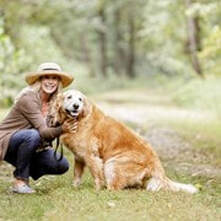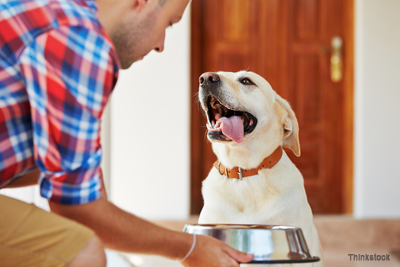|
1. Keep your dog trim Keep your dog at a slim, trim body weight. Obesity dramatically contributes to ever so many age-related, debilitating issues such as arthritis (a huge problem for way too many dogs), diabetes and heart disease. Feed your dog as little as it takes to maintain an ideal body condition score. Remember, in general, older dogs require approximately 30 percent fewer calories to maintain a healthy body weight. If your dog is overweight, ask your veterinarian to help you devise a plan to tackle this problem. 2. Feed your dog a complete diet Speaking of feeding your dog, be sure to choose diets that are:
3. Exercise with your dog Get out there and exercise with your dog! Not only will exercise help burn calories, it will strengthen muscles, enhance circulation and improve your dog’s heart and brain function. The activity you choose should be appropriate for your dog’s level of strength and stamina. No weekend warriors allowed. Shorter, more frequent walks may be better than going for a five-mile run. Gradually build up the duration and exertion of your dog’s activity level. 4. Keep your dog pain free Speaking of exercise, be sure to take the steps necessary to allow your dog to be active. If arthritis pain is getting in the way, work with your veterinarian to find the right combination of remedies to allow your dog to be comfortable enough to exercise. There are a myriad of treatment modalities to choose from:
5. Consider the changes your dog is going through As your aged dog experiences loss of hearing and/or vision, leash walks and closer supervision become a necessity. Prevent your canine senior citizen from encountering physical harm because of changes. Teaching hand signals at an early age will pay off as your dog begins to experience age-related hearing loss. Doublecheck the whereabouts of your older dog before pulling into, or backing out of your driveway. Older dogs are less agile. Add to this deeper sleep and diminished hearing or vision and, without extra caution, a driveway tragedy can happen. (Unfortunately, such tragic accidents occur all too often.) Whereas youngsters can recover from broken body parts lickety split, such is not the case for older dogs. 6. Act fast when your dog seems sick Act sooner rather than later when your dog isn’t feeling well. Compared to young and middle-aged dogs, seniors have less physical reserve and are more prone to becoming compromised following a spate of symptoms, including: Whereas a 24-hour “wait and watch” approach might be reasonable for the youngster with such symptoms, waiting this long with an older dog before contacting your veterinarian may have dire consequences. 7. Schedule more regular checkups with your veterinarian Even if you think your dog is perfectly healthy. Once a year is ideal for young and middle aged dogs. Switch to twice yearly exams for seniors. A head to toe physical examination, discussing how your dog is faring, and blood and urine testing (particularly if your dog is elderly) will allow your veterinarian to detect abnormalities early, prevent minor issues from becoming major issues, and outline a preventive health care plan for your beloved best friend.
0 Comments
Pets may not always “get” the holidays, but we do know they are drawn to the delicious smells and tastes of a feast, even if it is a tofurkey. It’s for this reason, unfortunately, that emergency veterinarians find themselves with much more business over the holidays.
Holiday feasts are often marked by excess. People tend to eat until they are uncomfortable, and then, just maybe, have a bit more. Celebrations may also be accompanied by the distractions of guests, games, songs and preparations. Then there’s the dreaded clean-up. With so much going on, it’s important to be particularly cautious with your pets this time of year. Common holiday food that could harm your dog Because we want to share our holidays, and because it’s hard to resist those big eyes, we may carve off “just a bit” for the dog. Before you give in though, stop and think carefully. Mostly, the food we eat, in small amounts, is not dangerous. Be aware, however, there are exceptions. The metabolism of dogs is considerably different from our own, and some pretty surprising things (frequently associated with holiday meals) can be toxic and even fatal:
Tips for your dog at the holidays:
|
Archives
November 2023
Categories |
|
HELPFUL INFORMATION
Office Hours
Monday: 8AM – 6PM Tuesday: 8AM – 6PM Wednesday: 8AM – 8PM Thursday: 8AM – 8PM Friday: 8AM – 5PM Saturday: 8AM - 12PM Sunday: CLOSED |
LOCATION
AND DIRECTIONS Salem Veterinary Hospital
2159 Lynnhaven Parkway, Suite 105B Virginia Beach, VA 23456 |
CONNECT
WITH US! |
Site powered by Weebly. Managed by IDEXX Laboratories


 RSS Feed
RSS Feed
